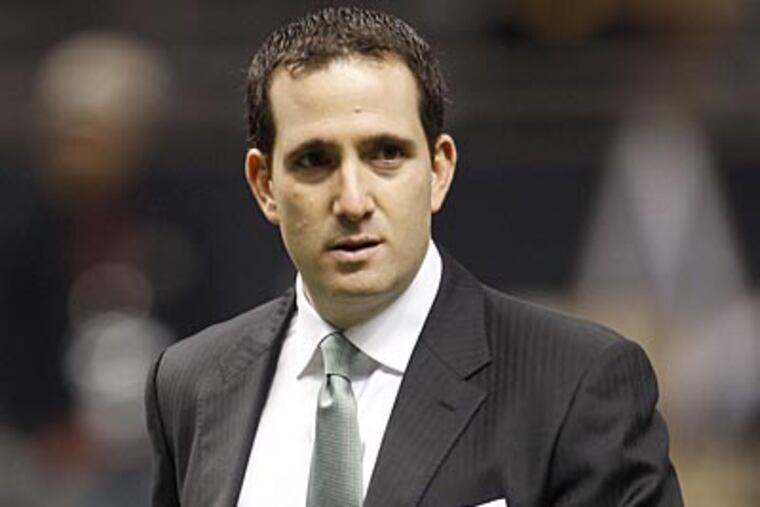Authority has increased for Eagles' general manager Howie Roseman
When Howie Roseman took over the business side of the Eagles' football operations this past offseason, he became one of 10 NFL general managers to handle both player evaluations and contract negotiations.

When Howie Roseman took over the business side of the Eagles' football operations this past offseason, he became one of 10 NFL general managers to handle both player evaluations and contract negotiations.
The number is down to nine after Panthers GM Marty Hurney was fired in October. The remaining eight reflect a wide array of decision-makers.
There are former players such as John Elway (Broncos) and Reggie McKenzie (Raiders). There are longtime scouts who worked their way up the chain of command such as Rod Graves (Cardinals) and Thomas Dimitroff (Falcons).
Bruce Allen (Redskins) is the son of Hall of Fame coach George Allen. Scott Pioli (Chiefs) got his start as a college coach. And then there are GMs such as Mike Tannenbaum (New York Jets), Mickey Loomis (Saints), and Roseman, who got their starts working with contracts and the salary cap. (Hurney was originally a sportswriter!)
Roseman rattled off the names when a reporter asked just before the season if it was unusual for a GM to be entrusted with so much responsibility.
"I guess it's not that uncommon," he said.
The degree to which each GM handles either the business side or the player-evaluation side depends upon his role with his team. Elway, for instance, will do only so many contracts. Roseman may oversee the Eagles' personnel department, but coach Andy Reid has final say on all football matters.
The 37-year-old Roseman, though, has more sway than most GMs because of his increasing authority. Ever since being named the youngest GM in January 2010, the Eagles have added more to his plate.
At the beginning of this past offseason, Roseman assumed Joe Banner's responsibility as chief negotiator and manager of the salary cap.
"I was definitely like, 'Bring it on,' because I love the opportunity to do more," Roseman said in September. "But we have a great staff that I empower that is able to funnel info to myself and Coach."
When Banner stepped down as team president in June, Eagles owner Jeffrey Lurie extended Roseman's contract an additional four or five years. Lurie has not commented publicly about Roseman's extension. It's difficult to glean whether it ensures that Roseman will be back.
But Lurie has made a point since the end of last season to separate Roseman from Reid and the ultimatum he made about the Eagles' needing to show "substantial improvement" on last season's 8-8 record. In Lurie's statements, it's fair to decipher that he believes this is Reid's 3-7 team.
When Lurie spoke at the June news conference announcing Banner's departure, he spent as much time talking about the young "stars" he had in Roseman and new president Don Smolenski as he did about the end of an 18-year partnership with his childhood friend.
To Lurie, the transition from the old to the new was "seamless." Roseman and Smolenski - an "outstanding next generation of executives," as Lurie called them - would lead the Eagles into their next phase.
So Roseman likely isn't going anywhere. The front office "succession plan" that was announced in June was established to give the Eagles some stability in case Lurie had to fire Reid, which appears all but certain now.
Roseman will aid Lurie in his search for the next head coach, and they will likely try to find a successor who will work in unison with the general manager to build the Eagles post-Reid.
As usual, Lurie and Roseman have declined interview requests to talk about the team during the season. But Roseman gave some insight into his role in the front office in relation to Reid and Smolenski in September.
For example, he was asked if it was accurate to say that he reports to Reid.
"That's fair. Andy has final say on all football decisions," Roseman said. "So at the end of the day he makes the call."
But Roseman plays a very important part in the evaluation process. He and his staff craft the draft board and grade every player in the league. As for the salary cap, Roseman is in charge of its allocation. While Banner, in essence, had only himself to answer to in this regard, Roseman gives Smolenski a heads-up over every move.
"I'll call Don and say, 'This is what we're doing,' and he will say, 'That's great,' " he said. "And he doesn't want to be involved in it."
Roseman said he delegates. Because the rookie salaries have essentially become structured he can hand over most of the negotiations to Aileen Daly, the team's general counsel, and Jake Rosenburg, who holds a role similar to the one Roseman had early in his tenure with the Eagles as manager of football administration.
Despite the added responsibility, Roseman said in September that he still devoted as much time to watching tape as he always did.
"I get a weekly report of how many college and pro players I've [evaluated] this year compared to the last three years," Roseman said. "It's all in the same numbers."
How much culpability he bears for the Eagles' last three drafts and last three seasons - they've gone 21-21 over that span - is the great unknown. Only a handful of people know.
Lurie is one of them.